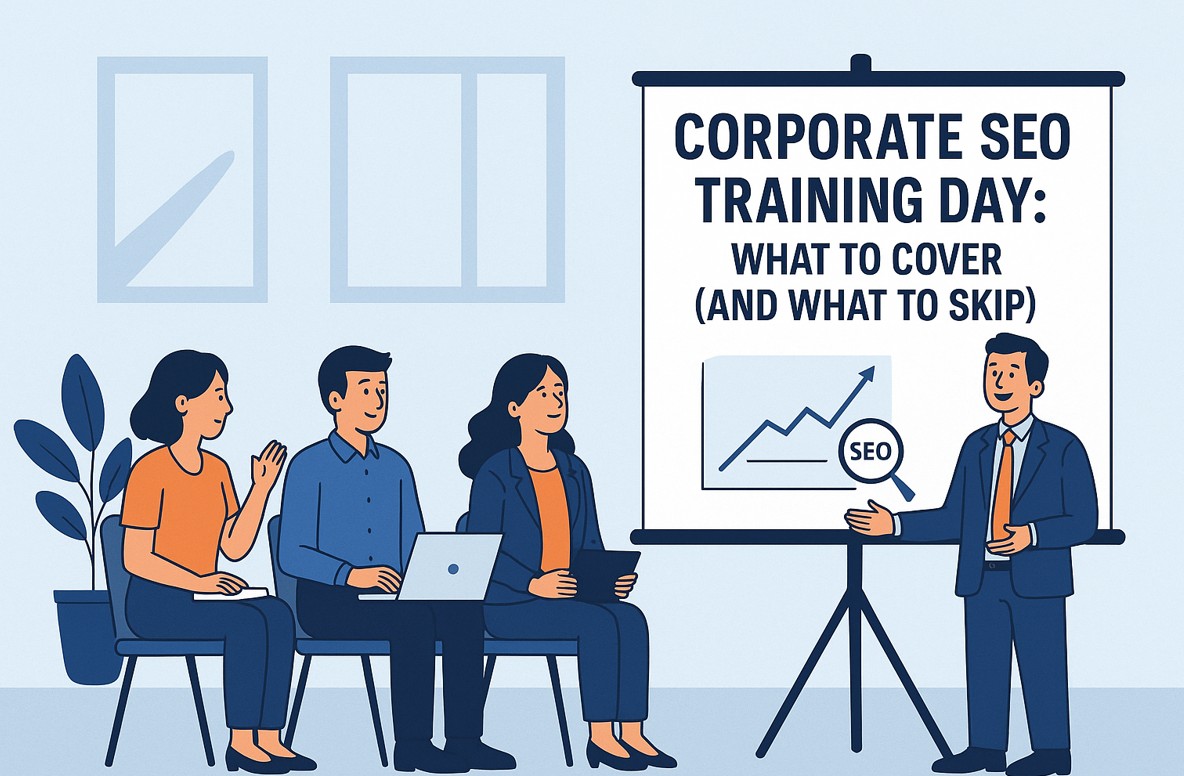If you’re planning a corporate SEO training day, you already know this: most people in the room won’t be SEOs—and that’s okay. The goal isn’t to turn your team into algorithm-chasing keyword wizards. It’s to give them just enough SEO knowledge to stop sabotaging your rankings… and maybe even help boost them.
Here’s what you should cover to make the day actually useful—and what you can skip without guilt.
What to Cover (Yes, Even If You’re Short on Time)
- What SEO Actually Is (and Isn’t) People have wildly different ideas of what SEO means. Clear that up early.
✅ Explain: SEO is about making content and websites more discoverable in search engines. It’s not magic. It’s not spam. And no, it’s not just “adding keywords.”
SEO is also not just the job of a single person or department. A good training day helps everyone—from marketers to developers—see how their role contributes to your website’s performance in search.
- How Search Engines Work (the Quick and Dirty Version) You don’t need to go deep into crawl budgets or semantic indexing. Just explain how Google finds pages, indexes them, and decides what to rank.
✅ Use visuals, analogies (sparingly), and examples from your own site if you can.
You can explain crawling as Google “visiting” your site, indexing as “filing” your pages, and ranking as the big competition for attention. It’s helpful for non-tech folks to hear that your pages don’t just appear by magic—they need to be seen and understood first.
- Why SEO Matters to Your Business If you skip this, the rest won’t land. People need to know why they should care.
✅ Share traffic stats, real search queries your customers use, or competitors outranking you.
Use data to tell a story: “Last quarter, we missed out on 20,000 clicks from this keyword group because our blog posts weren’t optimised.” Or: “Here’s a competitor ranking above us for every product name we sell.”
- The 3 SEO Areas: On-Page, Technical, and Off-Page Give a high-level overview of each without getting too into the weeds.
✅ On-page: titles, headings, keyword intent, internal linking. ✅ Technical: site speed, mobile-friendliness, crawlability. ✅ Off-page: backlinks, mentions, brand authority.
You don’t need to go into every single technical metric—just enough to make the concept of SEO feel like something they can influence.
- Content and SEO: What Writers, Editors, and Marketers Need to Know This is where the magic happens—and where things often go wrong.
✅ How to write content that’s both helpful for users and Google-friendly. ✅ Keyword intent (and why stuffing is bad). ✅ The importance of updating old content.
Explain things like heading hierarchy, how to naturally use keywords, and why FAQs are great for both users and search engines. People who write and publish content are often the ones making or breaking your SEO—so give them confidence, not confusion.
- Tools You Actually Use Don’t overwhelm people with dozens of tools. Just show the ones your team uses and how.
✅ A quick walk-through of Google Search Console, Screaming Frog, or your keyword tracker.
Keep it simple: what it does, why it matters, how to read one or two useful metrics. If you use dashboards, show those instead of making people log in to new platforms.
- What Each Team Can Do to Help SEO Make it practical:
- Writers: Use headers properly, answer search intent, link to related content.
- Designers: Don’t bury content in images. Compress things. Use alt tags meaningfully.
- Developers: Mind site speed, mobile UX, and structured data. No broken links or bloated code.
- Managers: Don’t publish things without SEO checks. Make SEO part of sign-off.
This part of the training should be collaborative. Ask teams what processes they follow, and where SEO could naturally be embedded.
- Local SEO and Branded Search (Bonus Module) If you’re a business with physical locations or a strong brand name, this one matters more than you think.
✅ Explain the basics of Google Business Profiles, local packs, and reputation signals.
✅ Branded search: how your name shows up in search, and why that first impression matters.
Even your PR or customer support teams might have a role to play here.
What to Skip (Trust Me)
- A Full History of Google Algorithm Updates They don’t care. You barely care. Instead, focus on current best practices.
- Every Single Ranking Factor Google says there are 200+. No one needs a list. Stick to the big, actionable ones.
- Meta Keywords Just… no. This hasn’t mattered in over a decade.
- Hour-Long Tool Demos Unless it’s hands-on and relevant, they’ll check out.
- Hardcore Link Building Tactics Unless you’ve got a digital PR team in the room, skip it. For most teams, outreach and backlink profiles aren’t their wheelhouse.
- Keyword Research Deep Dives Unless it’s relevant to the person’s job, keep keyword research high-level. Show how it informs strategy, don’t make them do it.
Bonus Tip: Keep It Interactive People learn better when they’re not being talked at for hours. Make it a workshop. Ask them to review a blog post or product page and find quick SEO wins. Do a live audit together. Get a bit nerdy, but keep it human.
Gamify it if you want—”SEO bingo,” “find the broken link,” or mini-challenges work well. Give small wins throughout the day.
A good SEO training day isn’t about turning everyone into experts—it’s about creating awareness, alignment, and momentum. Focus on what actually helps your team make better decisions. Skip the fluff. Keep it relevant. And if in doubt, show them how their work can help (or hurt) what shows up in search.
If your teams can walk away knowing:
- What SEO is and why it matters
- How their role touches SEO
- One or two ways they can improve their SEO impact today
…then you’ve done your job.
Want help running an SEO training day your team will actually enjoy—and remember? At Algo Digital, we offer fun, jargon-free, and actionable corporate SEO workshops that get your team aligned, motivated, and ready to contribute to organic growth.
Whether you need a half-day crash course or a full workshop tailored to your content, dev, and marketing teams—we’ve got you covered.
Visit algodigital.co.uk to learn more or book a discovery call today. Let’s make your next SEO training something people actually talk about (in a good way).




